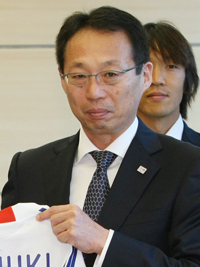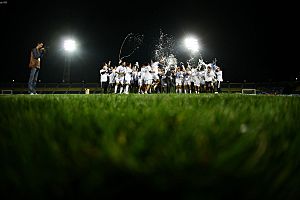Takeshi Okada facts for kids

25 May 2010
|
|||||||||||||||||||
| Personal information | |||||||||||||||||||
|---|---|---|---|---|---|---|---|---|---|---|---|---|---|---|---|---|---|---|---|
| Date of birth | 25 August 1956 | ||||||||||||||||||
| Place of birth | Osaka, Osaka, Japan | ||||||||||||||||||
| Height | 1.75 m | ||||||||||||||||||
| Playing position | Defender | ||||||||||||||||||
| Youth career | |||||||||||||||||||
| 1972–1974 | Tennoji High School | ||||||||||||||||||
| Senior career* | |||||||||||||||||||
| Years | Team | Apps† | (Gls)† | ||||||||||||||||
| 1980–1990 | Furukawa Electric | 189 | (9) | ||||||||||||||||
| Total | 189 | (9) | |||||||||||||||||
| National team | |||||||||||||||||||
| 1980–1985 | Japan | 24 | (1) | ||||||||||||||||
| Teams managed | |||||||||||||||||||
| 1997–1998 | Japan | ||||||||||||||||||
| 1999–2001 | Consadole Sapporo | ||||||||||||||||||
| 2003–2006 | Yokohama F. Marinos | ||||||||||||||||||
| 2007–2010 | Japan | ||||||||||||||||||
| 2012–2013 | Hangzhou Greentown | ||||||||||||||||||
|
Honours
|
|||||||||||||||||||
|
|||||||||||||||||||
Takeshi Okada (岡田 武史, Okada Takeshi, born August 25, 1956) is a Japanese football manager and former player who played as a defender.
Contents
Club career
Okada was born in Osaka on August 25, 1956. After graduating from Waseda University, he joined Japan Soccer League (JSL) club Furukawa Electric in 1980. In 1982, the club won 1982 JSL Cup. In 1986, the club won JSL and JSL Cup and he was selected Best Eleven. The club also won 1986 Asian Club Championship. This is the first Asian champions as Japanese club. He retired in 1990. He played 189 games and scored 9 goals in the league.
International career
On June 9, 1980, Okada debuted for Japan national team against Hong Kong. In 1982, he selected Japan for 1982 Asian Games. At the Asian Games, he played two games and scored a goal against South Korea. He also played in the 1980 Summer Olympics qualification and in the 1986 FIFA World Cup qualification. He played 24 games and scored 1 goal for Japan until 1985.
Coaching career
After retirement, Okada started his coaching career at Furukawa Electric (later JEF United Ichihara) in 1990. In 1995, he became a coach for the Japan national team. During the 1998 World Cup qualification Final round in October 1997, Japan's manager Shu Kamo was sacked and Okada was named his successor. In November, Okada led Japan to qualify for the 1998 World Cup for the first time in Japan's history. At the 1998 World Cup, Japan lost all 3 matches and he resigned after the World Cup.
In 1999, Okada signed with J2 League club Consadole Sapporo. In 2000, he led the club to win the J2 League and promoted the club to the J1 League. He resigned at the end of the 2001 season. In 2003, he signed with Yokohama F. Marinos. The club won the league title and he was also awarded Best Manager for 2 years in a row in 2003 and 2004. From 2005, the club performance was sluggish and he resigned in August 2006.
In November 2007, Japan national team manager Ivica Osim suffered a cerebral infarction. In December, Okada was named a new manager for Japan. In 2008, he selected numerous new young players, including Atsuto Uchida, Shinji Kagawa, Yuto Nagatomo, Keisuke Honda, Shinji Okazaki and many others. In 2009, Japan qualified for the 2010 World Cup. Okada gained worldwide attention for leading Japan to ninth-place finish in the 2010 World Cup. He was commended for turning his Japanese team of young, inexperienced players into a slick passing, talented squad of youngsters. He resigned after the 2010 World Cup. In November, he was awarded AFC Coach of the Year.
Okada signed a contract with Chinese Super League side Hangzhou Greentown on 14 December 2011. He extended his contract for two years in the end of 2012 season. However, he resigned from Hangzhou on 5 November 2013.
In November 2014, he bought a majority stake in FC Imabari and became a chairman of the club. In March 2016, he became a vice-president of Japan Football Association and served until March 2018.
Career statistics
Club
| Club | Season | League | Emperor's Cup | JSL Cup | Total | |||||
|---|---|---|---|---|---|---|---|---|---|---|
| Division | Apps | Goals | Apps | Goals | Apps | Goals | Apps | Goals | ||
| Furukawa Electric | 1980 | JSL Division 1 | 14 | 0 | 14 | 0 | ||||
| 1981 | 17 | 0 | 17 | 0 | ||||||
| 1982 | 18 | 0 | 18 | 0 | ||||||
| 1983 | 15 | 1 | 15 | 1 | ||||||
| 1984 | 17 | 0 | 17 | 0 | ||||||
| 1985–86 | 22 | 4 | 22 | 4 | ||||||
| 1986–87 | 21 | 1 | 21 | 1 | ||||||
| 1987–88 | 22 | 1 | 22 | 1 | ||||||
| 1988–89 | 21 | 1 | 21 | 1 | ||||||
| 1989–90 | 22 | 1 | 2 | 0 | 24 | 1 | ||||
| Career total | 189 | 9 | 0 | 0 | 2 | 0 | 191 | 10 | ||
International
| National team | Year | Apps | Goals |
|---|---|---|---|
| Japan | 1980 | 3 | 0 |
| 1981 | 5 | 0 | |
| 1982 | 2 | 1 | |
| 1983 | 7 | 0 | |
| 1984 | 4 | 0 | |
| 1985 | 3 | 0 | |
| Total | 24 | 1 | |
Managerial statistics
| Team | From | To | Record | ||||
|---|---|---|---|---|---|---|---|
| G | W | D | L | Win % | |||
| Japan national team | 1997 | 1998 | 15 | 5 | 4 | 6 | 33.33 |
| Consadole Sapporo | 1999 | 2001 | 106 | 58 | 16 | 32 | 54.72 |
| Yokohama F. Marinos | 2003 | 2006 | 113 | 52 | 32 | 29 | 46.02 |
| Japan national team | 2007 | 2010 | 50 | 26 | 13 | 11 | 52.00 |
| Total | 284 | 141 | 65 | 78 | 49.65 | ||
Honours
As player
Furukawa Electric
- Japan Soccer League: 1985–86
- Asian Club Championship: 1986
Individual
- Japan Soccer League Best Eleven: 1985–86
As Manager
Yokohama F. Marinos
- J.League Division 1: 2003, 2004
Individual
- AFC Coach of the Month: November 1997
- J.League Manager of the Year: 2003, 2004
- AFC Coach of the Year: 2010
- Japan Football Hall of Fame: Inducted in 2019
See also
 In Spanish: Takeshi Okada para niños
In Spanish: Takeshi Okada para niños


